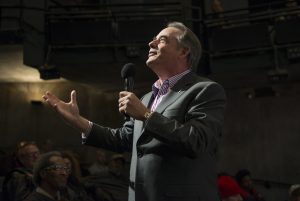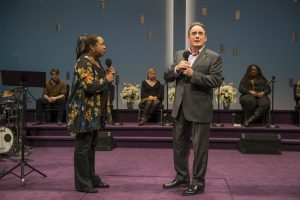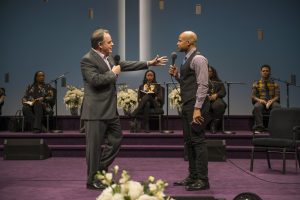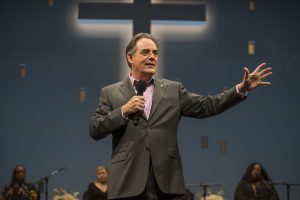HEAVEN MEANS HELL
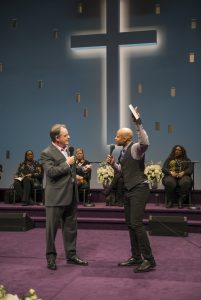 In King Charles III, now playing Chicago Shakespeare Theater, Mike Bartlett imagines what would happen if a king dares to act like one’”and opposes a Parliamentary proposal to fetter freedom of the press. (Hint: It doesn’t end well.) A similar speculation tears through Lucas (Isaac’s Eye, Death Tax, Hillary and Clinton) Hnath’s 75-minute one-act The Christians, now in an absorbing Steppenwolf Theatre Company production.
In King Charles III, now playing Chicago Shakespeare Theater, Mike Bartlett imagines what would happen if a king dares to act like one’”and opposes a Parliamentary proposal to fetter freedom of the press. (Hint: It doesn’t end well.) A similar speculation tears through Lucas (Isaac’s Eye, Death Tax, Hillary and Clinton) Hnath’s 75-minute one-act The Christians, now in an absorbing Steppenwolf Theatre Company production.
Hnath exposes what happens when a popular preacher at a mega-church (formerly just a storefront holy place) suddenly delivers a sermon that shocks. Unlike most holy-rolling pulpit-pounding, Pastor Paul (Tom Irwin) doesn’t denounce hell. No, he doubts it: Hell doesn’t exist, only heaven. Our obsession with the punishment of sinners only creates an “insurmountable distance” between people because’”wait for it!’”either we are all “saved in Christ,” even Hitler, or there is no salvation for “The Christians.” No country club for the blessed, heaven is really creation’s biggest refugee center.
At the center of K. Todd Freeman’s fascinating Chicago premiere is Paul’s challenge, courageous or foolhardy. The head minister contentedly presides over Walt Spangler’s state-of-the-art sanctuary, a place of peace where the choir is well-miked, the steps overflow with dahlias, and all debts have been erased thanks to tithes and contributions from the fervent parishioners. (They’ve also paid off damages incurred when a church member was messed up by a rogue escalator.)
As the rapid-fire repercussions ensue, Paul (the name is not accidental) narrates his apparent apostasy. His repudiation of an Inferno of fire and brimstone is based on two observations: One is the not so hypothetical case of a brave boy (who’s pagan, as in Muslim) who saves his sister’s life from a terrorist bomb but dies: However noble his sacrifice, according to Scripture this noble lad is doomed to eternal flames. The second ground for doubt is Paul’s construction of “Gehenna,” not a place of perdition in Hebrew, but an actual trash dump outside Jerusalem where criminals were disposed of. Hell is a case of bad translation.
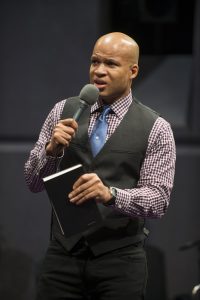 Paul argues’”to the initial amazement and final rejection by his massive ministry’”in a four-part sermon (“Where Are We Today?”; “A Powerful Urge”; “The Fires of Hell”; “A Radical Change”) that there’s a crack in the temple’s foundations. If there’s a hell it’s here. Satan is us. To deny these truths would make him a “false shepherd” to his needy flock.
Paul argues’”to the initial amazement and final rejection by his massive ministry’”in a four-part sermon (“Where Are We Today?”; “A Powerful Urge”; “The Fires of Hell”; “A Radical Change”) that there’s a crack in the temple’s foundations. If there’s a hell it’s here. Satan is us. To deny these truths would make him a “false shepherd” to his needy flock.
Of course, for the vast majority of Christians, heaven and hell are a package deal: Like love and marriage, you can’t have one without the other. So the pushback against this non-saint Paul is immediate. An old-school Bible thumper, associate Pastor Joshua (Glenn Davis), whose credo is goodness must be enforced and evil roasted for eternity, won’t accept this new gospel: He’s fired on the spot. (Later he will confess how his dying mother, ironically refusing to accept Christ as her last “lie,” seemed to echo Paul’s heresy.)
Likewise, a devoted congregant, sister Jenny (Jacqueline Williams), upset by her new boyfriend’s suspicions, weepingly wonders why Paul waited to abolish hell until after the church campaign was successfully concluded. Church elder Jay (Robert Breuler), a successful physician, hesitantly objects that firing Joshua will not fill the collections plates each Sabbath’”and he’s infernally correct.
Finally, even Paul’s faithful wife Elizabeth (Shannon Cochran) feels disrespected that he never confided his doubts in her, a skepticism she doesn’t share. Your “magnificence has worn off,” she tells her hell-killing hubbie. To protect her daughter from the lack of damnation, she must quit their now-unholy home.
The jubilation is over in this afflicted house of God.
What’s scary about Steppenwolf’s production is how the story and staging close in on Paul. Moving from a well-lit tabernacle with a seven-person band and a choir performing stirring spirituals, the stage slowly empties out, the pretty projections go blank, the lighting gets subdued and shrinks to spots, and the sound ebbs away to clandestine conversations that are farewells to any future.
The exchanges are electric and dispiriting between Irwin’s patriarchal, prophet-like Paul and Davis’s beseeching and indignant Joshua. The gulf between Cochran’s anguished helpmate and her doomed preacher-husband seems as “insurmountable” as their first meeting on a flight seemed inevitable.
However even-handed and forthcoming its script, The Christians is not a subtle screed. Hnath plays out the collateral damage from Paul’s latter-day sermon of revelations like a soul-shrinking experiment, an unseen altar crumbling away.
We taste the cynicism behind this sad schism. If Jesus returns, Hnath suggests, he’ll be re-crucified. Paul is martyred by the “good” worshippers of this integrated congregation for daring to denounce hell instead of sin and for insisting on inclusion over predestination. As this short play winds down, it’s fascinating how hollowly we hear the hymns’”until they cease altogether. Here’s a faith that “passeth all human understanding.”
The Christians
Steppenwolf Theatre Company
Downstairs Theater, 1650 N Halsted St
ends on January 29, 2016
for tickets, call 312.335.1650 or visit Steppenwolf
for more shows, visit Theatre in Chicago

